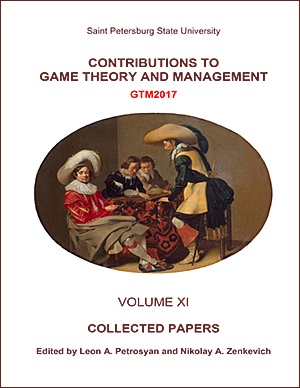Constructive and Blocking Power in Marine Logistics
Abstract
Transport industry in economy had been studied for many years, however, only recently researchers have begun to widely apply concepts of cooperative game theory to optimize costs and profits which are incurred in hauling. Today a wide range of cost/profit allocation methods have become a trend in transport segment, particularly in logistics operations. The most of these methods based on cooperative game theory consider the effect of collaboration (cooperation) which means the integration of companies as a key way to share transportation costs or profits. This study aims to contribute to this area of research by exploring different allocation methods such as the Shapley value, the nucleolus and some other excess based solution concepts of transferable utility game (TU game). In this work we overview existing studies on the subject and consider methodology of cooperative game theory. Further, we calculate numerical example of three shipping companies based on real data. In order to compare profit sharing results we compute the set of allocations and examine the constructive and blocking power of coalitions. The importance and originality of the work are that it explores the new field of application of game theory in logistics which can provide additional insights in this research area.
Keywords:
cooperative game theory, logistics, horizontal cooperation, cost allocation, Shapley value, nucleolus, SM-nucleolus, anti-prenucleolus, blocking power
Downloads
References
Frisk, M., Göthe-Lundgren, M., Jörnsten, K. (2010). Cost allocation in collaborative forest transportation. European Journal of Operational Research, 2(205), 448–458.
Gansterer, M., Hartl, R. (2018). Collaborative vehicle routing: a survey. European Journal of Operational Research, 268(1), 1–12.
Guajardo, M., Jörnsten, K. (2016). Constructive and blocking power in collaborative transportation. OR Spectrum, 1(38), 25–50.
Kohlberg, E. (1972). The nucleolus as solution of a minimization problem. SIAM Journal on Applied Mathematics, 23(1), 34–39.
Littlechild, S., Thompson, G. (1977). Aircraft landing fees: a game theory approach. The Bell Journal of Economics, 8(1), 186–204.
Maschler, M. (1992). The bargaining set, kernel, and nucleolus: a survey. In: Aumann, R.J., Hart, S. (eds.) Handbook of Game Theory, 1. Elsevier Science Publishers BV. 591–665.
Potters, J., Sudhölter, P. (1999). Airport problems and consistent allocation rules. Mathematical Social Science, (38), 83–102.
Schmeidler, D. (1969). The nucleolus of a characteristic function game, SIAM Journal on Applied Mathematics, 17, 1163–1170.
Shapley, L. S. (1953). A value for n-person games. In: Kunn and Tucker (eds.) Contributions to the Theory of Games, II. Princeton University Press, 307–317.
Smirnova, N. V., Tarashnina, S. I. (2012). Geometrical properties of the [0,1]-nucleolus in cooperative TU-games, (Russian). Matematicheskaya Teoriya Igr i Ee Prilozheniya, 4(1), 55–73.
Smirnova, N. V., Tarashnina, S. I. (2016). Properties of solutions of cooperative games with transferable utilities. Russian Mathematics (Iz. VUZ), 60(6), 63–74.
Sudhölter, P. (1997). The modified nucleolus: properties and axiomatizations. International Journal of Game Theory, 26, 147–182.
Sun, L., Rangarajan, A., Karwan, M. (2015). Transportation cost allocation on a fixed route. Computers & Industrial Engineering, (83), 61–73.
Tarashnina, S. (2011). The simplified modified nucleolus of a cooperative TU-game. TOP, 19(1), 150–166.
Young, H. P. (1985). Cost Allocation: Methods, Principles, Applications. Amsterdam: North Holland Publishing Co.
Downloads
Published
How to Cite
Issue
Section
License
Articles of "Contributions to Game Theory and Management" are open access distributed under the terms of the License Agreement with Saint Petersburg State University, which permits to the authors unrestricted distribution and self-archiving free of charge.




